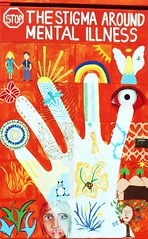Let's be honest, mental health is a market. It drives an industry. There is big money in mental health. Thousands of people leverage their position within the market by providing a service designed to help people. They possess skills, they have the training, and they have experience and that's all great. We need many more of these mental health professionals, and there should be funding to support less advantaged people's access to them. However...
There are real things that can be done every day by all of us to support our own, and each other's mental health. We don't need large corporate sponsors or big publicity t-shirt days to empower empathy, understanding, and unconditional care for each other. The moral and righteous path to improved mental health in our society is for people to be kinds to themselves, and each other EVERY DAY. We don't need a program, a campaign, a hashtag, or anything else other than the will to be human and cohabitate the planet peacefully doing our best to enjoy every moment we're blessed to have on this earth.
It's cliche, (most things that have been completely true for a really long time are,) but we must once and for all learn how to go really hard on issues, solving problems, and creating better futures, and really, really soft on the people we share our life-spaces with. A more important reality doesn't exist. We need an empathy reboot.
HumanKIND depends on it.






